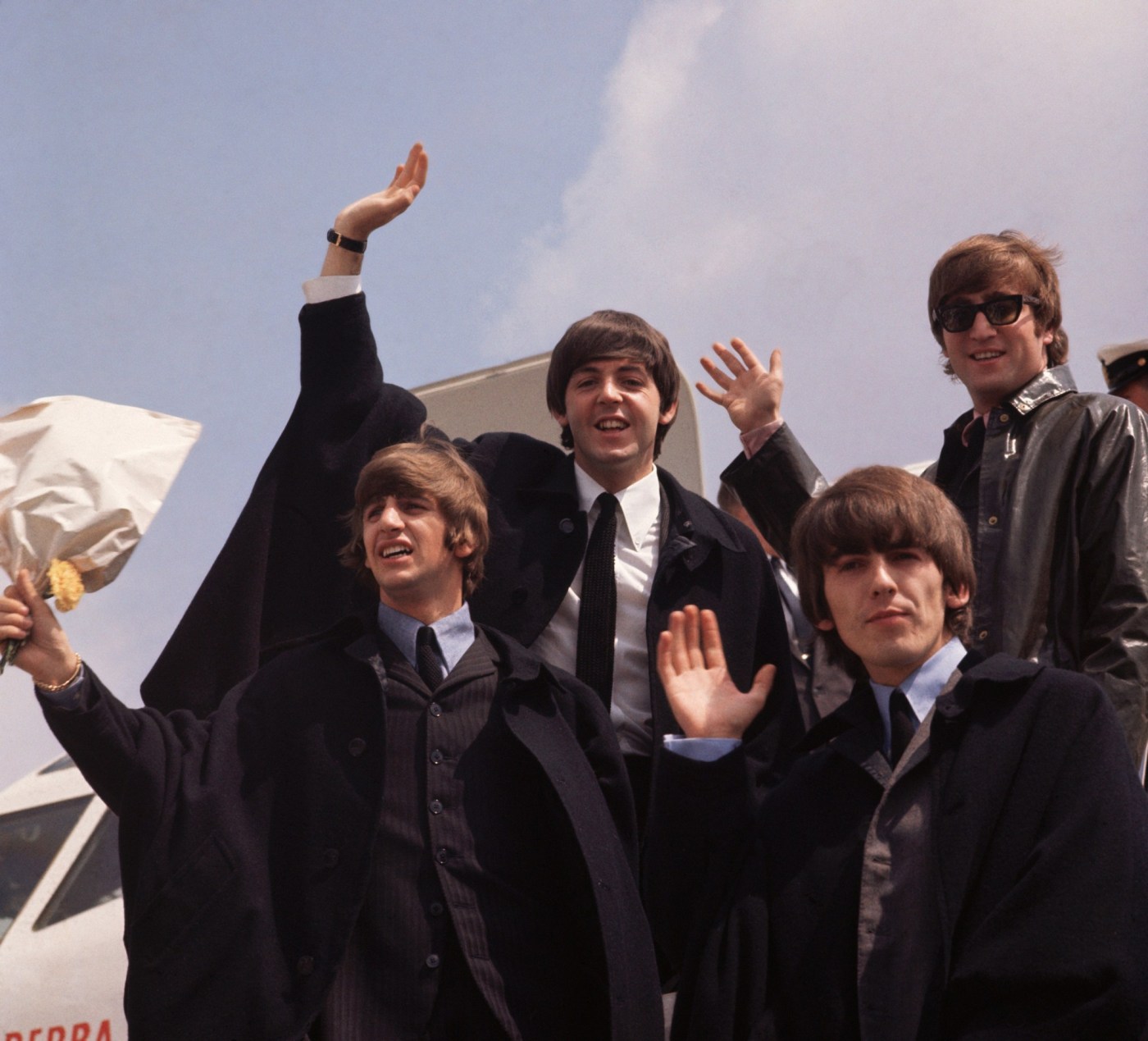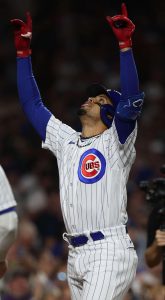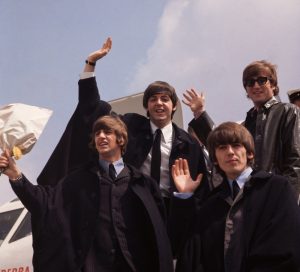
From the Beatles and Maria Callas to Thelonious Monk and Eric Clapton, new 2023 box sets run the gamut
Any CD or vinyl box sets worth releasing are worth rereleasing, ideally in expanded, more lavishly packaged and more expensive form.
That is not an official business model for the record industry, but it certainly could be with regards to new 2023 box sets by everyone from the Beatles to opera icon Maria Callas. Their new releases affirm that any box set done once is worth doing again, the bigger the better.
This seems to be the best way to entice music fans who want to ensure their collections are complete, even — make that, especially — if it means buying a box set they already have. Or, rather, a box set they already have that is now lacking compared to the newly expanded version of that set, which boasts songs not included in prior iterations, spiffy new audio mixes, accompanying books with extensive essays and artist interviews, memorabilia and more.
Consider the recently released updated versions of “The Beatles 1962-1966” and “The Beatles 1967-1970.” Between them, there are 21 songs not contained in the original 1973 releases or the 2013 editions. These include “Now and Then,” which came out last month and has been billed as “the last Beatles song.”
Not to be outdone, the new “La Divina: Maria Callas In All Her Roles” handily supplants 2007’s 70-CD “Maria Callas: The Complete Studio Recordings” and 2014’s 69-CD “Callas Remastered: The Complete Studio Recordings.” A box set for the ages, “La Davina” contains nearly twice as many CDs as the previous two sets combined.
This year’s other options range from the four-CD 50th anniversary “super deluxe edition” of Frank Zappa’s “Over-Nite Sensation” to a 10-CD Stevie Nicks’ career retrospective. There’s also “Here Comes Sunshine,” a 17-CD set of Grateful Dead concert recordings from 1973, and a posthumous 20-CD set of music by trailblazing progressive-rock keyboardist Keith Emerson.
For fans of worthy but obscure music, July saw the release of a 35-CD set by the Irish Celtic-rock band Horslips, which was formed in 1970 and split up in 1980. The set’s title — “More Than You Can Chew” — speaks volumes.
“The Beatles 1962-1966” and “The Beatles 1967-1970” 2023 Editions
In one of my favorite lines from “MTV’s Beavis and Butt-head,” teen slacker Butt-head remarks: “The Beatles? Those guys ruined music.” It’s a cogent piece of cultural criticism by the show’s creator, former San Diego blues band bassist Mike Judge, who fully appreciates that the Beatles raised the bar far higher than most bands could ever dream — in effect “ruining music.”
Exactly how high was partly chronicled on “The Beatles 1962-1966” and “The Beatles 1967-1970.” They were first released concurrently in 1973 and are more commonly known, respectively, as “The Red Album” and “The Blue Album.” The new 2023 edition adds nearly two-dozen songs, including this perpetually fab band’s rousing versions of the Isley Brothers’ “Twist and Shout,” Chuck Berry’s “Roll Over Beethoven” and Smokey Robinson’s “You Really Got a Hold On Me.” The other new additions, which help round out the Beatles’ oeuvre in this collection, include “I Saw Her Standing There,” “Here, There and Everywhere,” “Tomorrow Never Knows,” “Dear Prudence,” “Blackbird” and “I Want You (She’s So Heavy).”
Including more songs by George Harrison is a plus. So is the enhanced audio separation between instruments, which provides greater clarity — check out the romping “Hey Bulldog,” the more prominent hand claps on “I Saw Her Standing There” and the sparkling vocal harmonies on “Magical Mystery Tour.” The results provide an even better sense of how well the Beatles played together as an ensemble constantly striving to outdo itself with each new studio recording.
So far, so good. But while the new vinyl version places the newly added songs on a separate disc, the CD version has the songs in chronological order. That may be jarring for anyone fond of the original running order. Moreover, 37 of the 75 selections included here were newly remixed this year by Sam Okell and Giles Martin, the son of original Beatles’ producer George Martin. All but one of the other 38 songs were remixed by the younger Martin between 2015 and 2022 for other, non-box set rereleases.
Almost everything has have been retooled, sonically speaking, to appeal more to younger listeners who enjoy experiencing music that sounds and feels louder when heard on their earbuds. The audio compression that results may be welcome to a Gen Z audience that regards streaming songs on phones as the optimal way to hear them — and doesn’t mind that the quiet parts are boosted, even though doing so greatly reduces the music’s dynamic range. But for those fans for whom the Beatles have long provided essential musical DNA and rightly regard audio compression as a detriment, louder is not better, just louder.
Operatic soprano Maria Callas in September 1958. (Erich Auerbach/Getty Images/TNS)
Maria Callas, “La Divina: Maria Callas In All Her Roles”
The biggest box set of the year may also be the biggest bargain, quantitatively speaking. Timed to coincide with what would have been this month’s 100th birthday of one of the greatest singers in opera history, “La Davina” pays tribute to Maria Calas with a sky-is-the-limit approach. The “In All Her Roles” subtitle is literal — this set spotlights a dizzying 74 of the roles she sang, 34 of which are included here in their entirety. Some of them, including “Carmen” and “La Bohème,” are studio recordings of roles she never performed live.
The set includes131 CDs, three Blu-Rays and one DVD-ROM, which provides librettos, texts and interviews (in French) with Callas. That makes “La Davina” the deepest of dives for devotees of this quintessential diva, who was 53 when she died in 1977. The New York-born soprano is the subject of Marina Abramović’s 2020 opera, “7 Deaths of Maria Callas,” and an upcoming film starring Angelina Jolie.
Callas’ career peaked between the late 1940s and late 1950s. Her performances of “Tosca,” “La Traviata,” “Aida,” “Medea” and other staples set an enduring standard in opera for dramatic expressiveness and vocal brilliance. Blessed with a nearly three-octave range, she sang with exceptional agility, flexibility, and — in her heyday — pinpoint dynamic control. Those attributes are at the fore in the voluminous set, which is available from Amazon for $254.04, a price that comes out to less than $2 per CD.
LOS ANGELES, CALIFORNIA – SEPTEMBER 24: Eric Clapton performs onstage during Day 2 of Eric Clapton’s Crossroads Guitar Festival at Crypto.com Arena on September 24, 2023 in Los Angeles, California. (Photo by Kevin Winter/Getty Images for Crossroads Guitar Festival)
Eric Clapton, “The Definitive 24 Nights”
Released in 1991, “24 Nights” was culled from a series of concerts by Eric Clapton and his band recorded at London’s Royal Albert Hall in 1990 and 1991, where he performed a staggering 42 concerts during that two-year period. “The Definitive 24 Nights” adds 35 previously unreleased songs, more than double the 15 selections that appeared on the original version 32 years ago.
The new set, which includes a Blu-ray disc and a hardbound book, devotes a disc apiece to Clapton’s rock, blues and orchestral shows at the Royal Albert Hall. Each clocks in at nearly two hours. San Diego bass great Nathan East, a longtime Clapton band member, performs on some of the selections, while guest appearances are made by such blues dynamos as Buddy Guy, Albert Collins and Robert Cray.
The songs include classics from Clapton’s 1960s tenure with the pioneering power-trio Cream (“White Room” and “Sunshine of Your Love”), solo hits (“Lay Down Sally” and “Wonderful Tonight,” which both last more than eight minutes) and reverent renditions of gems by Ray Charles, Little Walter and J.J. Cale. The shortest selection is East’s fleet-fingered solo version of Weather Report’s “A Remark That You Made.” The longest is the genre-blurring “Concerto for Electric Guitar,” which is almost 29 minutes in length and has never been available before.
Genesis, “BBC Broadcasts”
Strong concepts can be undone by shaky execution, as this five-CD set of live Genesis recordings attests. Documenting the evolution of the band is certainly a worthy endeavor, especially given Genesis’ gradual — and completely unexpected —shift from artfully executed progressive-rock to slick, chart-topping pop.
“BBC Broadcasts” does a good job of presenting the band, then fronted by Peter Gabriel, in the first half of the 1970s. But there is nothing to document what the group sounded like between 1975, when Gabriel left the group and Genesis drummer Phil Collins replaced him, and 1978. That means there is nothing to document the period in 1976 where former Yes drummer Bill Bruford came on board and added an improvisatory edge not heard in Genesis before or since.
On the plus side are the 19 selections recorded at the band’s 1980 performance at the Lyceum Theater in London, which bristle with excitement. Then comes a seven-year gap, from 1980 to 1987, which adds another glaring hole to this chronologically sequenced set. And why anyone saw fit to include two 1988 songs featuring singer Ray Wilson, Collins’ nearly forgotten replacement, is a mystery.
Rock guitar virtuoso Jimi Hendrix (1942 – 1970) caught mid guitar-break during his performance at the Isle of Wight Festival, August 1970. (Photo by Evening Standard/Getty Images)
Jimi Hendrix Experience, “Hollywood Bowl, August 18, 1967”
How great is the continuing demand for music by electric guitar icon Jim Hendrix, who made only four albums before he died in 1970 at the age of 27? So great that this new two-CD set is — astonishingly — the 86th album to feature the Seattle native that has been posthumously released.
It was recorded at a 1967 Hollywood Bowl concert that found Hendrix and his two English band mates, drummer Mitch Mitchell and bassist Noel Redding, opening for the Mamas & the Papas. Nine songs strong, the set offers four Hendrix originals (“Fire,” “Foxey Lady,” “Purple Haze” and “The Wind Cries Mary”) along with his versions of songs by the Beatles (“Sgt. Pepper’s Lonely Hearts Club Band”), Chip Taylor (“Wild Thing”), Bob Dylan (“Like a Rolling Stone”) and blues giants Howlin’ Wolf (“Killing Floor”) and Muddy Waters (“Catfish Blues”).
The result is a live outing that is appealing, if not quite indispensable. It captures Hendrix and his band performing for an audience that was largely unfamiliar with their music — the concert took place five days before the U.S. release of the Experience’s game-changing debut album, “Are You Experienced?” The intensity of the trio’s performance is palpable and Hendrix ignites with his six-string wizardry. One can only imagine what fans of the harmony vocal-drenched the Mamas & the Papas made of Hendrix that night, although he surely won over some new followers despite the odd-couple pairing.
Thelonious Monk (1917 – 1982) jazz musician, lounging on a sofa. (Photo by Erich Auerbach/Getty Images)
Thelonious Monk, “Brilliant Corners”
Craft Recordings’ limited edition Small Batch vinyl album series was launched with the express goal of showcasing classic jazz, folk, bluegrass and rock albums with the highest sonic quality possible. It does so by pressing the original analog tape recordings on 180-gram vinyl “using Neotech’s VR900 compound and a one-step lacquer process to reduce surface noise and increase clarity and the music’s dynamic range.” Craft also wisely employs Bernie Grundman, who earned a 2019 Lifetime Achievement Grammy Award for his stellar achievements with audio equalization, compression, sound limiting, stereo enhancement and lacquer cutting.
Jazz giant Thelonious Monk’s landmark 1957 release, “Brilliant Corners,” is especially well-suited for Craft and Grundman. The album — one of the first 50 selected for the Library of Congress’ National Recording Registry — teams Monk with such then-budding fellow music giants as saxophonist Sonny Rollins and drummer Max Roach. The selections — including “Pannonica,” “Bemsha Swing” and the title track of “Brilliant Corners” — stand among Monk’s best as a pianist and composer whose knotty melodies, twisting rhythms and unique harmonic sensibilities made him a peerless artistic force.
Only 4,000 copies were pressed of this new/old album. It is designed for audiophiles who relish the opportunity to hear this music so clearly and vividly it almost feels like you were in the recording studio when this album was made 66 years ago. The extensive liner notes by Grammy-winning music author Ashley Kahn are insightful, while the packaging — replete with an archival-quality, non-scratching, anti-static, inner sleeve — is first-rate. The price is undeniably steep, but for those seeking an exemplary listening experience, it’s an investment worth considering.
Sonny Stitt, “Boppin’ in Baltimore: Live at the Left Bank”
Alto saxophone powerhouse Sonny Stitt was 69 when he died in 1982. A protean player who never seemed to run out of ideas, he performed with equal fire and finesse. Widely noted for his Charlie Parker-like fluidity and articulation, he counted Dizzy Gillespie, Miles Davis and Gene Ammons among his many notable collaborators.
This two-CD live set was recorded in late 1973 at the Baltimore jazz club the Famous Ballroom, where Stitt and his quartet performed under the auspices of the Left Bank Jazz Society. He was accompanied by a superb band that included pianist Kenny Barron, bassist Sam Jones and drummer Louis Hayes. Stitt shines whether ripping through “A Different Blues,” adding a Latin lilt to “Star Eyes” or delivering a lush aural seduction with “Lover Man (Oh Where Can You Be?).” With most of the eight songs stretching between 10 and 19 minutes, the musicians have ample time to stretch out yet rarely overstay their welcome.
The accompanying liner notes have an archival interview with Stitt and comments from his son and daughter, Jason and Katea Stitt. “Boppin’ in Baltimore” is the third live album released this year by the Jazz Detective label of concerts recorded under the auspices of the Left Bank Jazz Society. With more than 1,000 other performances in the vaults — and 23 other Left Bank live albums previously released — it surely won’t be the last.
Yes, “The Yes Album” Super Deluxe Edition
Change was afoot in a big way when the pioneering English progressive-rock band Yes recorded “The Yes Album” in 1971. It was the first of the group’s three releases to exclusively feature songs written by the band. It was also the first with guitarist Steve Howe (who replaced Yes co-founder Peter Banks) and the last with keyboardist Tony Kaye (who was replaced by Rick Wakeman later the same year).
More importantly, it was Yes’ strongest work to date and the album where the band’s sound and style crystallized on such classics as “Yours Is No Disgrace,” “I’ve Seen All Good People” and “Starship Trooper.” The combination of powerful instrumental work, soaring vocal harmonies and intricate, multi-part songs became a Yes trademark that would influence Rush, Queen, Dream Theater, Starcastle and other bands on both sides of the Atlantic.
This new box set contains a remastered version of the original vinyl album and a Blu-ray disc that offers three different audiophile remixes by Steven Wilson. There are also four CDs, one featuring Wilson’s 2014 remixes, one with 10 songs from two different 1971 concerts by Yes, and one of rarities. Among the latter is a studio version of “Clap,” the Howe acoustic guitar tour de force that was recorded in concert for the original release of “The Yes Album.”
Casual listeners will surely balk at hearing eight different versions of “I’ve Seen All Good People.” And they may not fully welcome Howe and Bill Bruford’s extended guitar and drum solos on the live version of “Perpetual Change” recorded at Yale University 42 years ago — or marvel at how unusual it was for Bruford to use two bass drums in his solo. But Yes devotees most assuredly will.
6th June 1969: Frank Zappa (1940 – 1993), lead singer with the Mothers of Invention, rehearsing for a concert at the Royal Albert Hall during his European tour. (Photo by Ron Case/Keystone/Getty Images)
Frank Zappa, “Over-nite Sensation: 50th Anniversary Super Deluxe Edition”
Talk about upping the ante! When “Over-nite Sensation” was first released in 1973, it had seven songs and a playing time of less than 35 minutes. The new 50th anniversary edition offers 88 selections, 75 of which are previously unreleased. In addition to the original studio album, the set includes 28 songs recorded at 1973 concerts in Hollywood and Detroit, along with alternate studio versions of some selections.
Zappa crafted “Over-nite Sensation” to be less dense and more accessible than his 16 previous albums, and he largely succeeded. His penchant for writing song lyrics that focused on sexually explicit subject matter on such songs as “Dinah Moe Hum” — whether meant to be satirical or serious — have not aged well. But the music often soars, thanks to Zappa’s virtuoso band, his fiery guitar solos and guest appearances by French violin great Jean Luc Ponty and Tina Turner and The Ikettes, whose contributions to the original “Over-nite Sensation” were — at Ike Turner’s dogged insistence — uncredited.
©2023 The San Diego Union-Tribune. Visit sandiegouniontribune.com. Distributed by Tribune Content Agency, LLC.


